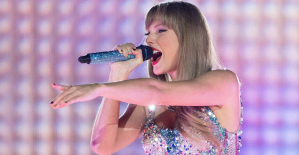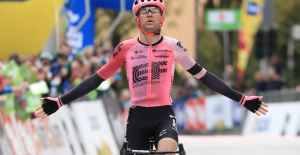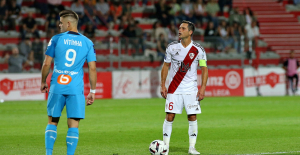There are lots of dresses sevillanas by the floor and two workers are hanging on cables which cross from side to side of the roof of one of the boards of Tabacalera de Madrid. The orders are given by Pilar Albarracín (Seville, 1968), which organizes the rhythm by colors. The first time you saw the Roof of offerings was in the Royal Shipyards of Seville, 14 years ago, at the biennale curated by Harald Szeemann. “I'm looking forward to that I buy so that I can maintain. I don't have the ability to save my works, you know what I suffer when I see a production that I am being misleading? And I refuse to malvenderlas or to give to the institutions,” explains the artist, a few days before the opening of his first retrospective exhibition.
This Thursday, hundreds of women from the station, sevilla-Santa Justa will come down to the AVE in Atocha, and go dressed in gypsy, in “procession”, the old Tobacco Ambassadors, so close and yet so far from the Reina Sofia Museum. There the expected the author of the action, Pilar Albarracín, who with them inaugurated the exhibition —organized by the Ministry of Culture and entitled That I removed what you dance— which reveals, after 25 years of work, one of the races more consistent, committed and strong in the denunciation of the repression of women, their liberation, in religious traditions and the Spanish identity and, ultimately, in the desacralization of the art.
ahead of todaythere Are about 60 pieces, including photographs, videos, drawings, performances and installations, which demonstrate that the street and the body are the scenarios on which it acts to treat gender-based violence since the nineties. Because Albarracín was today before I got to the newspapers. It is not fortune teller, but his resistance to the Pashabahis prejudices allowed him to get ahead of the game published. That's why they have so much currently three actions filmed in 2004: in Viva España, she crosses the streets of the city beset by a band that plays that tune country; I will dance on your grave is a choreography of four feet above the struggle of equality; and in the spectacular Lunar, she wears a suit of seville, completely white, stained with the blood which is done by pricking it with pins.
The work of Albarracín, with an international projection that is rare among artists of his generation, focuses on serving the woman who tries to resist and survive in a society that will reserve the spaces forgotten, the leftovers of patriarchy. It is critical, ironic, brilliant, and a source of its modernity in the resistance against the pressures of economic, cultural, and gender. Work from the archetype to override the clichés, without cancelling the tradition. But is an artist and, as such, is not free of precariousness. Are the many of the night, and is with the commissioner, Pia Ogea, and with the operators, which are still riding.
“In an exhibition will be paid to everyone but the artist. What do we eat? The money gives you the ability to create, to travel, to have helpers, but if you're honest, and independent, in the end, it is very difficult to make a living,” he says. Are you going to charge for this exhibition? “I don't know, am I going to charge?”, he asks the curator. And Ogea responds: “there is No concept of fee of the artist, not you can check as well in the Ministry of Culture”.
The exhibition is dedicated to his son Nicholas and to all those people in your life: “I would have loved to spend more time [with them] and did not do it because I was working. Being an artist is also a trade, but not paid,” he explains. Assume with joy and a drop of bitterness that your work is very appreciated, but you are missing shopping. “That is appreciated I do not bring anything that will make my life easier. Here I am at work. And the physical labor each time costing me more”, he says while last of the works in this old factory. The Tobacco recovered for the arts seems like a place more representative of society than a museum, “which is a site that only represents those who direct it”. Albarracín is not in the collection of the Reina Sofia and the ditch: “The political result of the art does not have to do with art.”

 Sydney: Assyrian bishop stabbed, conservative TikToker outspoken on Islam
Sydney: Assyrian bishop stabbed, conservative TikToker outspoken on Islam Torrential rains in Dubai: “The event is so intense that we cannot find analogues in our databases”
Torrential rains in Dubai: “The event is so intense that we cannot find analogues in our databases” Rishi Sunak wants a tobacco-free UK
Rishi Sunak wants a tobacco-free UK In Africa, the number of millionaires will boom over the next ten years
In Africa, the number of millionaires will boom over the next ten years WHO concerned about spread of H5N1 avian flu to new species, including humans
WHO concerned about spread of H5N1 avian flu to new species, including humans New generation mosquito nets prove much more effective against malaria
New generation mosquito nets prove much more effective against malaria Covid-19: everything you need to know about the new vaccination campaign which is starting
Covid-19: everything you need to know about the new vaccination campaign which is starting The best laptops of the moment boast artificial intelligence
The best laptops of the moment boast artificial intelligence Bitcoin halving: what will the planned reduction in emissions from the queen of cryptos change?
Bitcoin halving: what will the planned reduction in emissions from the queen of cryptos change? The Flink home shopping delivery platform will be liquidated in France
The Flink home shopping delivery platform will be liquidated in France Bercy threatens to veto the sale of Biogaran (Servier) to an Indian industrialist
Bercy threatens to veto the sale of Biogaran (Servier) to an Indian industrialist Switch or signaling breakdown, operating incident or catenaries... Do you speak the language of RATP and SNCF?
Switch or signaling breakdown, operating incident or catenaries... Do you speak the language of RATP and SNCF? Who’s Who launches the first edition of its literary prize
Who’s Who launches the first edition of its literary prize Sylvain Amic appointed to the Musée d’Orsay to replace Christophe Leribault
Sylvain Amic appointed to the Musée d’Orsay to replace Christophe Leribault Jeremy Allen White to play Bruce Springsteen for biopic
Jeremy Allen White to play Bruce Springsteen for biopic In Los Angeles, Taylor Swift hides clues about her new album in a library on the street
In Los Angeles, Taylor Swift hides clues about her new album in a library on the street Skoda Kodiaq 2024: a 'beast' plug-in hybrid SUV
Skoda Kodiaq 2024: a 'beast' plug-in hybrid SUV Tesla launches a new Model Y with 600 km of autonomy at a "more accessible price"
Tesla launches a new Model Y with 600 km of autonomy at a "more accessible price" The 10 best-selling cars in March 2024 in Spain: sales fall due to Easter
The 10 best-selling cars in March 2024 in Spain: sales fall due to Easter A private jet company buys more than 100 flying cars
A private jet company buys more than 100 flying cars This is how housing prices have changed in Spain in the last decade
This is how housing prices have changed in Spain in the last decade The home mortgage firm drops 10% in January and interest soars to 3.46%
The home mortgage firm drops 10% in January and interest soars to 3.46% The jewel of the Rocío de Nagüeles urbanization: a dream villa in Marbella
The jewel of the Rocío de Nagüeles urbanization: a dream villa in Marbella Rental prices grow by 7.3% in February: where does it go up and where does it go down?
Rental prices grow by 7.3% in February: where does it go up and where does it go down? With the promise of a “real burst of authority”, Gabriel Attal provokes the ire of the opposition
With the promise of a “real burst of authority”, Gabriel Attal provokes the ire of the opposition Europeans: the schedule of debates to follow between now and June 9
Europeans: the schedule of debates to follow between now and June 9 Europeans: “In France, there is a left and there is a right,” assures Bellamy
Europeans: “In France, there is a left and there is a right,” assures Bellamy During the night of the economy, the right points out the budgetary flaws of the macronie
During the night of the economy, the right points out the budgetary flaws of the macronie These French cities that will boycott the World Cup in Qatar
These French cities that will boycott the World Cup in Qatar Tour of the Alps: Simon Carr takes on the 4th stage of the Tour of the Alps, marked by a big scare
Tour of the Alps: Simon Carr takes on the 4th stage of the Tour of the Alps, marked by a big scare Cycling: in video, Chris Harper's big scare on the 4th stage of the Tour des Alpes
Cycling: in video, Chris Harper's big scare on the 4th stage of the Tour des Alpes Football: Mathieu Coutadeur will retire at the end of the season
Football: Mathieu Coutadeur will retire at the end of the season Athletics: young Tebogo says African sprinters will dominate the season
Athletics: young Tebogo says African sprinters will dominate the season


















